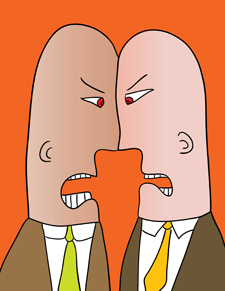 It can be difficult to work toward civility. Religious discord has lasted several millennia; the divide between the sexes, even longer.
It can be difficult to work toward civility. Religious discord has lasted several millennia; the divide between the sexes, even longer.
Perhaps getting opposing groups together to talk it out won’t solve all of the world’s problems on the first go around, but it’s a good first step, says Joe Miles, an assistant professor of psychology.
“I think there is a need for us to communicate with more civility and learn to dialogue with one another versus debating,” Miles says. “This is important in politics, but also across racial and religious groups. These issues are constantly evolving, and there is a need for discussion.”
Miles recently received a PhD from the University of Maryland in counseling psychology, and at UT, he teaches classes on multicultural psychology, intergroup dialogue, social justice, and group facilitation. He hopes also to gain licensure to become a psychotherapist, allowing him to perform individual and group therapy.
For his research, Miles focuses on group dynamics and group interventions, as well as intergroup dialogue. The need for intergroup dialogue became especially apparent last January, after a high-profile shooting in Tucson that left six people dead and thirteen injured (including Congresswoman Gabrielle Giffords). After the shooting, many questioned whether political rhetoric had become too vicious, and a call for more civilized discourse between different ideological groups was put forth.
“There are maybe some more drastic events happening,” Miles says. “I think those extreme sort of events draw more attention to intergroup relations.”
Intergroup dialogue is more than just words, however; ideally, it helps bring about social justice and a lasting understanding between groups. Miles is especially interested in continuing his work on issues within the LGBT community.
Miles’s research dovetails perfectly with the university’s new civility initiative, which encourages inclusivity, diversity, open dialogue, and collegiality among all members of the UT community. Miles notes that the diversity of the UT community is, in itself, a resource that can work to bring about greater civility, and he hopes to set up an intergroup dialogue program at the university in the future.
